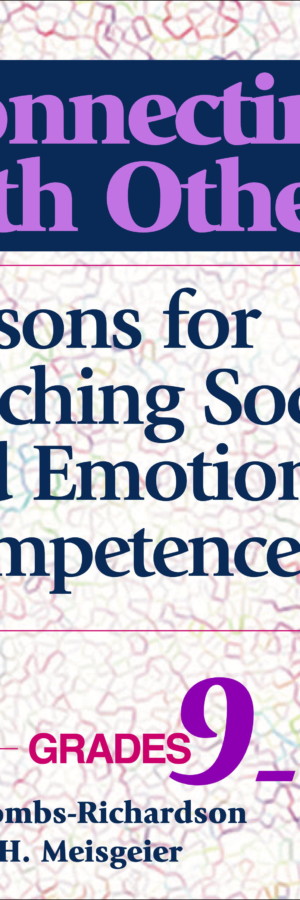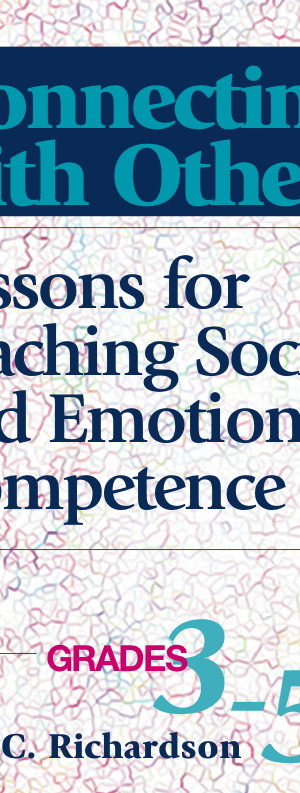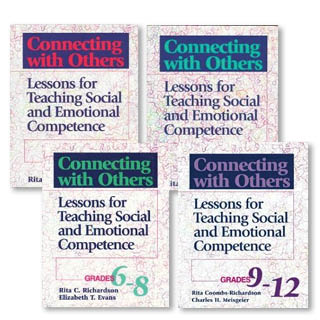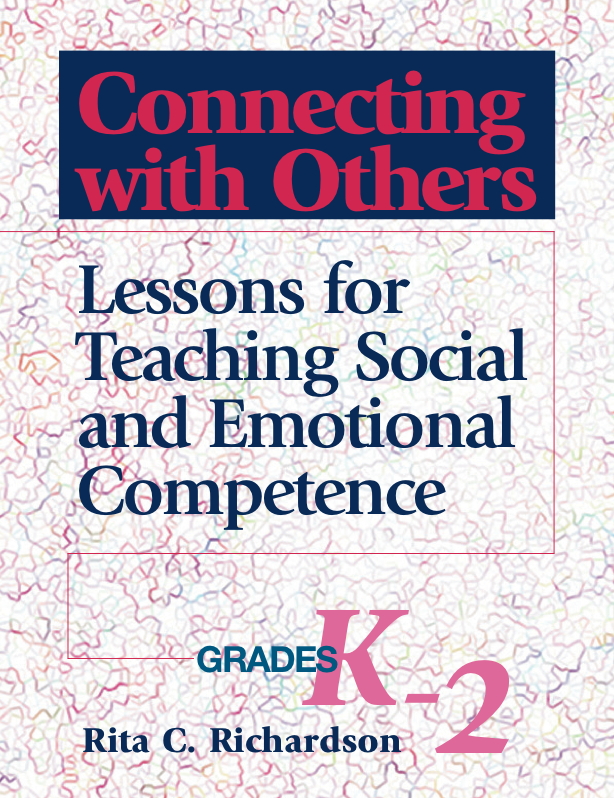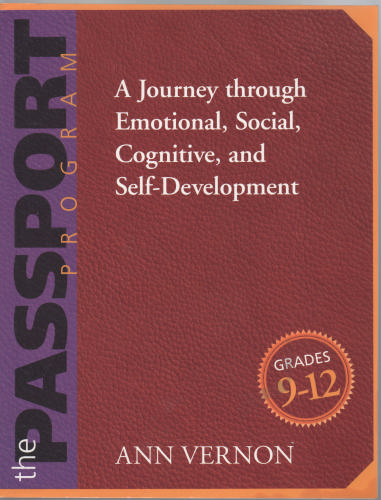Connecting With Others for grades 9 through 12 is a proactive social-emotional learning program that helps high school students learn skills in self-advocacy, communication, interpersonal behaviors, and problem solving.
This book includes 40 learning activities that take into consideration cultural, ethnic, and gender diversity. The activities are divided into the following skill areas: Awareness of Self and Others, Communication, Responsibility, Conflict Resolution, Cooperation, Love and Empathy, Personal Growth, Preparing for Adulthood.
Review
“Perhaps one of the best books of its kind ever written, the publisher integrates quality text with graphics and artwork which facilitates easy use and is attractive for students.”
— Professional School Counseling
LESSONS
Preliminary Lessons
- Theoretical Frameworks
- Stop and Relax
Skill Area 1: Awareness of Self and Others
- It’s Great to Be Feeling
- I Believe in Me
- Winners and Nonwinners
- I’m Like a Bouncing Ball
- It’s OK to Be Different—Sometimes
Skill Area 2: Communication
- Actions Speak Louder Than Words
- You Talk, I’ll Listen
- Put Your Own Spin on It
- Look at Me, Hear Me Out
- Let’s Not Fuss, Let’s Discuss
Skill Area 3: Responsibility
- If I Said It, I’ll Own It
- If I Feel It, I’ll Own It
- If I Did It, I’ll Own It
- Who’s Perfect?
- Be All That You Can
Skill Area 4: Conflict Resolution
- Peacekeepers
- What’s the Problem?
- I Can Be My Own Boss
- Breaking It Up Peacefully
- Let Bygones Be Bygones
Skill Area 5: Cooperation
- More Heads Are Better Than One
- Lean on Me, I’ll Lean on You
- It’s a Dog-Eat-Dog World—Or Is It?
- Please! I’d Rather Do It Myself
- Together, We’re Great
Skill Area 6: Love and Empathy
- What Is Love?
- They Say That Falling in Love Is Wonderful
- This Can’t Be Love
- Love Your Neighbor
- I Get Your Drift
Skill Area 7: Personal Growth
- Clean as a Whistle
- Social Graces in Different Places
- Dependable or Dependent?
- Health Is Wealth
- I Am a Citizen
Skill Area 8: Preparing for Adulthood
- What Will I Be When I Grow Up?
- Families, Friends, and Frustrations
- My Time, My Money
- And Baby Makes Three
- It’s Off to Work We Go
FIGURES
Skill Area 1: Awareness of Self and Others
Lesson 1
- Scenario 1: Martin Jones
- Scenario 2: Marcia Garcia
- Scenario 3: Tom Wang
- Reinterpreting the Scenarios
Lesson 2
- Affirmation Journal
- How Do I Rate?
Lesson 3
- Winner/Nonwinner Checklist
- Winner and Nonwinner Characteristics
- Winner Synopsis
- Winner Commitment Contract
Lesson 4
- Resiliency Chart
- United High School Dilemma
Lesson 5
- Psychological-Type Preferences: Background Information
- Psychological-Type Preferences
- Personality Survey
- Personality Characteristics and Job Requirements
- Personality Quick Quiz
- Personality Quick Quiz Answer Key
Skill Area 2: Communication
Lesson 1
- Teacher Exercise: Verbal and Nonverbal Communication
- Communication Dramas
- Communication Quick Quiz
- Communication Quick Quiz Answer Key
Lesson 2
- Preparations for the Communication Games
- Instructions for Communication Games
Lesson 3
- Instructions for Perceptions Exercise
- Story 1
- Story 2
Lesson 4
- Verbal Communication Quick Quiz
- Verbal Communication Quick Quiz Answer Key
- Sample Sentence
Lesson 5
- Discussion Guidelines
- Discussion Questionnaire
- Topics for Discussion
Skill Area 3: Responsibility
Lesson 1
- Irresponsible and Responsible Statements
- Two Role-Plays
- Irresponsible or Responsible?
- Irresponsible or Responsible Answer Key
Lesson 2
- Basic Emotional Needs
- Basic Emotional Needs Sample Answers
- Setting Goals to Meet Emotional Needs
- Sources for Success
- My Growth Plan
- Basic Emotional Needs Quick Quiz
- Basic Emotional Needs Quick Quiz Answer Key
Lesson 3
- Goal-Setting Worksheet
- Responsible Assertion
Lesson 4
- Who’s Perfect Quiz
- My Profile
- Working on My Challenges: Personal Goals
Lesson 5
- All That I Can Be Quiz
- Persistence Story
- What’s the Motive?
- Goals and Motivations
Skill Area 4: Conflict Resolution
Lesson 1
- Choosing Your Battles Questionnaire
- What Do I Value Survey
Lesson 2
- Responding to Conflict
- Describe the Problem
Lesson 3
- Strategies for Self-Management
- Responses and Better Responses
- Six Dilemmas
- Evaluation Form
Lesson 4
Lesson 5
- Forgiveness and Reconciliation Scenario
- Five Vignettes for Role-Playing
- Aggressive, Nonassertive, and Assertive Apologies
- Stages of Reconciliation Quiz
Skill Area 5: Cooperation
Lesson 1
- Cooperating to Solve Dilemma 1
- Cooperating to Solve Dilemma 2
- Rules for Group Cooperation
Lesson 2
- Roles for Cooperative Learning and Working
- Self-Assessment
- Mount Everest High School Students Rebel
- Group Assessment
Lesson 3
- Competition on Ice
- The Cheerleader’s Mom
Lesson 4
- Eight Types of Intelligence
- Multiple Intelligences Worksheet
- How Strong Is My Preference?
Lesson 5
- Is It Fair and Equitable?
- Tony’s Gripe Team at Work
- Movie Review
Skill Area 6: Love and Empathy
Lesson 1
- The Five Stages of Love
- What is Love?
- Love Quiz
Lesson 2
- Shanesia’s Dilemma
- Criteria for Research Paper and Presentation
- Check Yourself
Lesson 3
- Questioning Obsessive Love
- Problem Relationship Scenarios
- Jealousy Quiz
- Jealousy Dilemma
Lesson 4
- Melting-Pot or Salad-Bowl Dilemmas
- Tolerance Quiz
- Dear Ann Flanders
- Baklava Recipe
Lesson 5
- Helping Organizations for Volunteer Work
- Don’s Dilemma
- Empathy Exercise
Skill Area 7: Personal Growth
Lesson 1
- Style Quiz
- Dress-Code Problem
Lesson 2
- Dear Ann Flanders
- Dear Mr. Manners
- Dear Ibby
Lesson 3
- Binge Drinking
- One for the Road to Destruction
- Criteria for Research Paper and Presentation
- Presentation Evaluation
- Dear Ann Flanders
- Three Dilemmas
- Park’s Dilemma
Lesson 4
- You Can Never Be Too Thin—Or Can You?
Lesson 5
- Persuasion Techniques
- Self-Contract for Responsible Citizenship
- A Citizen’s Responsibilities
Skill Area 8: Preparing for Adulthood
Lesson 1
- Erik Erikson’s Eight Stages of Life
- Three Life-State Dilemmas
- Poem: Growing Up
Lesson 2
- Maslow’s Pyramid of Needs
- Poem: New Friends and Old Friends
- The New Kid in Town
- Family and Friends
- Tom, Where Are You?
Lesson 3
- Cathy’s Budget Crisis
- Budgeting Your Time
- Time and Money Quiz
Lesson 4
Lesson 5
- Holland’s Personality Types, Behaviors, and Possible Occupations
- Guidelines for Setting Career Goals
- Personality Comparison: Myers-Briggs and Holland
- Career Quiz
The Connecting with Others program is an evidence-based curricular approach for developing children’s self-awareness and awareness of others. Each lesson in the four volume series follows a specific lesson cycle and includes instructional materials for each activity. The theoretical underpinnings of the program include Transactional Analysis, Positive Assertion Training, and Cognitive Behavior Modification.
A study utilizing the Connecting with Others Grades K-2 and Grades 3-5 was implemented in five Louisiana public elementary classrooms containing general education and special education students. The purpose of the study was to investigate whether this social skills program would enable students with disabilities in inclusive classrooms to develop skills that would facilitate socialization with peers with and without disabilities. The research question addressed the students’ acquisition of social skills as a result of the training. The results of the study indicated with reasonable assurance that the students did grow in the skill areas identified in the program (Coombs-Richardson et al 2009).
In another study, the program was implemented in two early childhood classrooms located on the campus of a state university in Virginia. This study evaluated the impact of the social skills training on the social behaviors of the children. Participating were 30 students with an average age of four-years ten-months. The income levels of the families varied from low social economic status to high middle economic status. To assess the socio emotional skills level of each child, two examiners independently completed the Social Skills and Attitude Scale (SSAS) which is a component of the Connecting with Others program. The examiners observed the children and recorded children’s pre and post intervention behaviors on a checklist. The study yielded positive evidence that the social skills instruction and activities did make a meaningful difference in increasing targeted social skills of the children (Coombs-Richardson, Myran, and Tonelson 2009).
Two master’s thesis studies were conducted at Wayne State College in Nebraska to study the impact of social skills instruction using the Connecting with Others: Lessons for Teaching Social and Emotional Competence (Richardson 1996a). Hurner (2006) implemented the training in an after school program to determine if it would impact students’ behaviors on their return to their early childhood formal school setting. The general educators filled out rating scales on each of the students before and after the social skills instruction. Twelve of the 18 participating students showed improvement in all five categories. This study provided support for the use of a school-based social skills program to increase the social skills of students with behavior problems and/or difficulties with social interactions. Based on the results of the teachers’ responses, the researchers concluded that the social skills learned in the after-school program were generalized in the school environment.
Social skills training in early childhood sets the stage for students’ future behaviors in schools. Larson (2008) examined the effects of the Connecting with Others curriculum on the behavior of students in an early childhood program. The children received instruction taught by the researcher. Pre and post scales of the BASC-2 Rating Scale (Reynolds and Kamphaus 2005) and the Connecting with Others Rating Scale were used to determine if each child demonstrated progress in their behaviors and/or in their social-emotional skills as a result of the intervention. The instruction had a positive impact on the behaviors of the early childhood students who participated in this study. All 18 participants showed improvement in at least two categories derived from Connecting with Others (Richardson 1996) and improvement in at least one category from the BASC-2. Twelve of the 18 participating students showed improvement in all six of the Connecting with Others (Richardson 1996) categories. Additionally, 13 out of 18 students demonstrated improvement in at least seven of the 13 BASC-2 categories.


